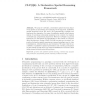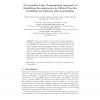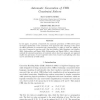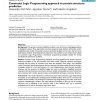248
click to vote
COSIT
2011
Springer
14 years 1 months ago
2011
Springer
Abstract. We propose CLP(QS), a declarative spatial reasoning framework capable of representing and reasoning about high-level, qualitative spatial knowledge about the world. We sy...
154
click to vote
AIME
2011
Springer
14 years 2 months ago
2011
Springer
This paper describes a novel methodological approach to identifying inconsistencies when concurrently using multiple clinical practice guidelines. We discuss how to construct a for...
136
click to vote
FUIN
2010
14 years 11 months ago
2010
This paper explores the use of Constraint Logic Programming (CLP) as a platform for experimenting with planning problems in the presence of multiple interacting agents. The paper ...
123
click to vote
CORR
2010
Springer
15 years 1 months ago
2010
Springer
Abstract. The paper investigates a novel approach, based on Constraint Logic Programming (CLP), to predict the 3D conformation of a protein via fragments assembly. The fragments ar...
115
click to vote
RC
2002
15 years 1 months ago
2002
Existing interval constraint logic programming languages, such as BNR Prolog, work under the framework of interval narrowing and are deficient in solving systems of linear constrai...
157
click to vote
CL
1999
Springer
15 years 1 months ago
1999
Springer
Van Emden's incremental queries address the inadequacy of current Prolog-style querying mechanism in most logic programming systems for interactive problem-solving. In the co...
141
click to vote
CORR
2004
Springer
15 years 1 months ago
2004
Springer
In this paper, we present a framework for automatic generation of CHR solvers given the logical specification of the constraints. This approach takes advantage of the power of tab...
149
click to vote
BMCBI
2004
15 years 1 months ago
2004
Background: The protein structure prediction problem is one of the most challenging problems in biological sciences. Many approaches have been proposed using database information ...
112
click to vote
WCET
2008
15 years 3 months ago
2008
In this paper, we propose the use of constraint logic programming as a way of modeling contextsensitive execution-times of program segments. The context-sensitive constraints are ...
129
click to vote
HOTDEP
2008
15 years 4 months ago
2008
We describe a technique for writing distributed applications which manage themselves over one or more utility computing infrastructures: by dynamically acquiring new computational...




